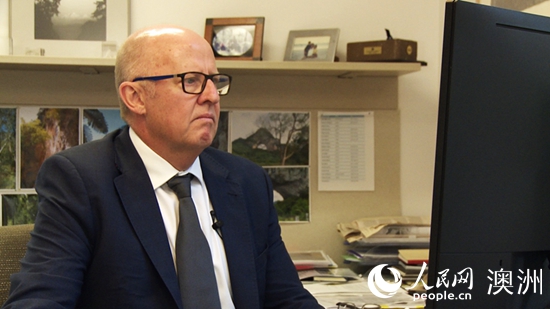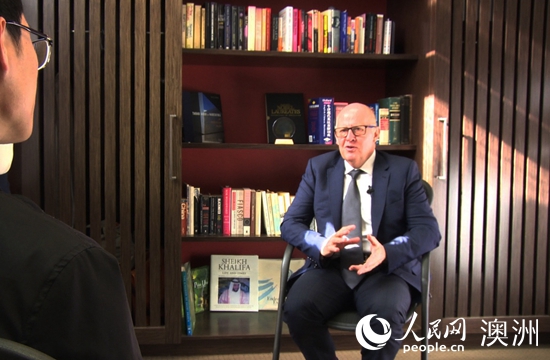located at garden's point in downtown brisbane, the queensland university of technology has a beautiful campus adjacent to the brisbane botanical garden and queensland parliament house.
the queensland university of technology was founded in 1989. with a history of 30 years, the university has been cooperating with china for more than half of that time. "my experience as a diplomat has helped me to bridge the gap between china and australia and to help the students and researchers in the queensland university of technology gain more opportunities to work together in both countries," said professor scott sheppard, deputy vice-chancellor of the queensland university of technology.

professor shepard (photo/dajing)
professor shepard first visited china in 1981, and since then he has worked and studied there for several years. since 2008, as the deputy vice-chancellor of the queensland university of technology, he has remained in close contact with china. he told us that one of the main reasons for his shift from diplomacy to education is that he believes education has a huge impact on young people.
in the 1980s, professor sheppard majored in modern chinese history, mandarin and chinese economy at griffith university and obtained a bachelor's degree in modern asian studies. he went on to study at taiwan normal university and the chinese university of hong kong.
after graduation, professor sheppard joined the department of foreign affairs and trade and began his career as a diplomat, where he worked in several roles and was responsible for developing bilateral cooperation in education, science and technology with china.
in professor sheppard's office, many reference books on chinese learning line the bookshelves. "i really enjoy learning chinese. i find it very practical and interesting," he said.
professor sheppard visits china at least three times a year. his impression of chinese people is that they are friendly and willing to help foreigners learn chinese.
the cooperation between the queensland university of technology and chinese universities is continuously deepening, according to professor sheppard. "we send students to chinese computer and engineering companies, such as huawei in beijing or shenzhen, to open up their horizons. connecting with the world's most dynamic economy is unimaginable for students under traditional education."

professor shepard (photo/dajing)
in terms of scientific research, the queensland university of science and technology and chinese universities have jointly established two research projects. one is the institute of environment and climate, which was established together with jinan university. the other is the joint laboratory of tissue engineering and regenerative medicine established with wuhan university. "that allows our researchers to work with very high-quality chinese scientists and it's been mutually positive where we've had support from both the australian and chinese national governments," said professor sheppard.
professor sheppard said that both china and australia are located in the asia-pacific region, and there is ample space for cooperation between these two countries. the collaboration between professor ian fraser of australia and chinese scientist dr. jian zhou in the development of a cervical cancer vaccine is a model for cooperation between china and australia in science and education.
to date, the queensland university of technology has cooperated with many universities in china such as beijing normal university, sun yat-sen university, and jinan university. with the visit to the southwestern university of finance and economics in 2014, the queensland university of technology began to cooperate with universities in western china. "we try to be selective in having a smaller number of deeper relationships than a lot of light relationships," sheppard noted.
looking at the future cooperation between the two countries, professor sheppard said: "i think that one of the areas we could do more in is people-to-people links. it has a tangible impact when people visit china and get to understand the richness of the culture through things like food, chinese opera, and chinese film. people will get a much better understanding."
